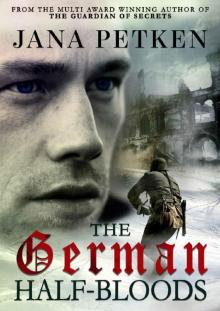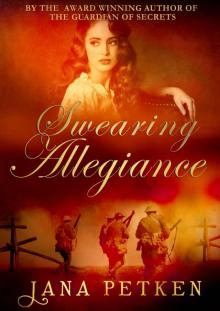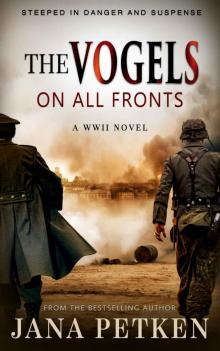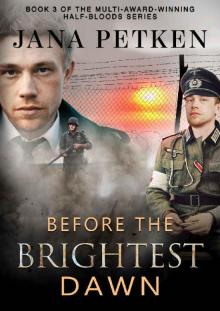- Home
- Jana Petken
Swearing Allegiance (The Carmody Saga Book 1) Page 14
Swearing Allegiance (The Carmody Saga Book 1) Read online
Page 14
As he waited for the sergeant to finish his inspection, he wondered how Jimmy Carson was getting on. He’d left two days previously for his hearing, vowing that should he be released, he’d go straight back to Dublin to stir up the republican brotherhood. Every prisoner had accumulated a wealth of military knowledge during incarceration in Frongoch, and every one of them couldn’t wait to share it with the comrades back home.
The sergeant looked at the papers and began. “When your name is called, pick up your bundle and get on the truck outside. Don’t converse with any other prisoner when you leave the hut and don’t accept notes or letters from anyone.”
Danny mentally counted the names as they were called. That’s ten names … eleven … twelve …
“John Grant!” Danny looked at Jenny’s fiancé and smiled at him as he passed on his way out. At least Jenny would be happy, he thought. More names were called…
“Daniel Carmody.”
Danny’s stomach lurched. He put on his cap, picked up the trousers and shirt that he’d arrived in, and then made a point of making eye contact with Michael Collins, who occupied one of the bunks opposite. He wanted to assure Michael that he was fully committed to the cause and that he’d be ready for any actions deemed appropriate once he was back in Dublin. But the guards posted at the door had their beady eyes on every man that walked to the hut’s exit, and he couldn’t say a thing except to tell Michael goodbye.
“Well, that’s it, John. We’re on our way,” Danny said, sitting in the back of the truck.
“We are indeed.” John grinned. “And it’s a stroke of luck our going together. If we get released, we can go straight to your granny’s house. Jenny will be thrilled to see me.”
Danny kept his thoughts to himself. Jenny might be happy to see John, but his mam would probably send him packing with a clip around the ear.
“She will be,” he said, meaning Jenny. Looking at John’s face with its animated expression, Danny hoped that Jenny was still as desperate to get married as she had been before the rising. He wouldn’t mind having John in the family. Below average height and weight, he didn’t look particularly impressive, but he had an agile mind, and a mouth that spewed out fancy words that seemed to make a lot of sense. He’d also been popular with the other men in Frongoch, due in part to his great compositions. If someone wanted to express himself to a loved one through the written word, John was the person to go to. He could make a man sound like Romeo’s big brother. John was like his da in that respect. Both of them wrote highly motivational articles for the republican movement. According to the leadership, they were very good at their jobs and were valuable assets.
“Your da’s not here,” Danny commented as the driver started the engine. “He’ll be disappointed that he’s not going with you.”
“He’ll join me soon enough.”
“You can’t be sure of that, John.”
“Oh, but I am. Why would the British want to keep him here? He’s old, with a hell of a cough. They’re already fed up of having to get the doctor in to him every five minutes. I doubt they’ll want to carry out a dead Irishman from this camp. The newspapers would have a field day.”
“Oh, John, man. You have a real talent for theatrics,” Danny said, laughing. “Will you go straight back to Dublin after you see my Jenny?”
“No, I plan on marrying her first in one of those civil ceremonies. You know, in a town hall or something. Then I’ll take her back to Dublin with me.” John grew serious then. “I thought I would have heard from her, mind you. I know she’s probably still angry with me, but Jesus, I’ve written her eight letters. How many times does a man have to apologise before he gets forgiveness?”
“Perhaps she didn’t get them,” Danny said absently. He glimpsed the shop as the truck passed it. Men’s heads blocked a clear view of the road. The truck was packed, with barely an inch of floor visible between bodies. He couldn’t see the shop door or if Anna was standing there waving, or watching, or weeping. Closing his eyes, he pictured her smiling face and held it in his mind for as long as he could. It was too late to say more or do anything else to persuade her. All he could do now was pray that she loved him enough to leave her home and family.
The prisoners, accompanied by six guards, travelled in a train compartment usually reserved for cows and sheep. Since it lacked furnishing, such as seats, the men were forced to sit on top of a thin layer of straw lining the floor. On the wall next to the sliding door were two high up windows, only a foot in length and width. The carriage was as dark a winter’s night. It was stiflingly hot and filled with the nauseating stench of animal waste and men’s sweat.
The train’s continuous swaying and the men’s inability to move about or settle in more comfortable positions made the journey seem more like a voyage in a small boat battling choppy seas. Most of the men, sitting back-to-back with their neighbours, leaned on each other for support.
Danny cradled his belly with arms wrapped around his waist. The nausea had begun about an hour into the journey, and it wouldn’t go away. A few of the men had already been sick. He felt the bile inside him taunt his body. It rose, fell, and then rose again, but it had not yet had the decency to expel itself from his mouth.
“I’d feel better if it just came out,” he moaned to John, sitting next to him.
“I’m feeling perfectly grand. I always did have a strong constitution,” John replied smugly.
Upon hearing the sound of someone behind him retching, Danny turned just in time for his face to receive a splattering of another man’s breakfast. Groaning, Danny wiped the regurgitated food from his eyes, called the man a filthy git, and then accepted profuse apologies. It wouldn’t be so bad had they been given enough space to lie down, Danny thought, throwing a scathing look at one of the guards, who had brought his own stool to sit on.
“Are we nearly there yet?” one of the prisoners asked hours later.
The guard, sitting on the stool with his back leaning against the carriage wall, took out his pocket watch and nodded. “About two hours to go,” he said, and went back to reading his book by gas light.
“Can we get some water to wash the sick off us or are you going to leave us here smelling like pigs?” Danny shouted angrily.
When he got no response, he craned his neck to look at the four other guards playing a game of poker and scoffing sandwiches like there was no tomorrow. He could feel his rage boiling over. If there was one thing he hated, it was being ignored.
“When you’ve finished eating your lunch, of course!” he yelled even more aggressively. “Far be it for us Irish to inconvenience you – ya bunch of insensitive bastards.”
“Danny, shut up, will you?” one of the other prisoners hissed loudly over the train’s chugging. “Some of us are thirsty and hungry, and we’ll get nothing if you carry on.”
Still feeling nauseous, Danny retorted, “Jesus, Bob, you must have a cast iron stomach, man.” Then he remembered that Bob operated one of the ferries that crossed the choppy waters from Dublin to Holyhead.
It was already growing dark by the time the group arrived at London’s Euston station. The men had been allowed to get off the train three times during the long journey to see to nature and to stretch their legs for five minutes. Danny felt as though he’d been squatting all day on a bed of stingy nettles. His bum was probably blistered to hell, he thought, stepping off the train. His legs, wobbling like his mam’s jelly, dragged behind him, and he had a pounding headache, probably due to a lack of decent ventilation on the train.
“My arse is asleep,” John said, hobbling behind Danny.
“Aw, stop your whining. It wasn’t that bad,” Danny lied through his teeth. “Look at the guards. The gits are enjoying our suffering.”
Another man, walking beside Danny, turned to John and said, “Danny’s right so stick a smile on your face. Don’t give them the satisfaction of having a laugh at our predicaments.”
Whilst waiting to get on the transport, Danny remi
nisced about the last time he’d been to London. It was four years previously, when the family had been to visit Minnie and Da; he had been more interested in seeing the sights. He’d spent hours at the Tower of London, imagining himself as a soldier for the king, defending the crown and beheading enemies. It never occurred to him back then that one day the king and crown would become the foe he wanted to vanquish. As usual, Da had been very busy; splitting his time between Harley Street and King’s College, and the family had hardly seen hide or hair of him during their two-week stay.
“It all looks a bit different to the last time I was here,” he remarked to John as they got on a truck parked on Euston Road.
“I’ve only been here five minutes, and I hate it,” John said.
Chapter Twenty-One
A guard collected Danny to attend his appeals hearing. Sighing with relief, he picked up his bundle and followed the guard out of the section of prison where he’d shared a cell with four other men for the past two days and nights. John had been taken away the evening before and hadn’t returned, leaving Danny to wonder if he was already in Greenwich or if he’d not won his appeal and was being kept somewhere else until his transfer back to the Frongoch camp. He hoped to find out soon. He was one of the last of his group to be called, and he felt like a lost lamb looking for his flock.
The guard knocked on a door. A voice shouted, “Come!” Danny was ushered inside. Behind the desk sat an officer. Without looking at the man’s face, Danny peered at the rank insignia pinned to the shoulders of his uniform jacket. A captain, he thought, noting the three diamonds with one gold button above them. That was a good sign. According to the guards at Wormwood Scrubs, the decision as to whether to release or re-incarcerate a man was taken immediately, except in extenuating circumstances. One of the men had asked what those circumstances might be and was told that on occasion no officer of sufficient rank was available to sign the necessary papers. The hearing was often cancelled at the last minute, and when that happened, the selected prisoner was taken to another section of the prison to wait until his name came back to the top of the list.
Danny watched the captain shuffle papers, which he presumed held information about a prisoner – in this case, him. Finally, after a long wait, the officer looked up and gave Danny the most contemptuous stare he had ever received. Danny felt the hair on the nape of his neck bristle with anger. During his time at Frongoch, the guards and prisoners had enjoyed a casual truce. Generally, the soldiers had been fair. They had not denied a single man his dignity or his freedom to talk about everything and anything, as long as the conversation did not lead to politics or religion. On occasion, they’d participated in friendly games of football against the prisoners, and they had set up chess competitions when it rained. He hadn’t seen such disdain on the face of any man since that march of defeat on Sackville Street, and he did not intend to let the arrogant prick sitting in front of him get away with it now.
“You live on Victoria Street in Dublin?” the captain asked, sounding as though he were sucking a plum.
“I do,” Danny answered, although that wasn’t strictly true now.
“Are you married?”
“No.”
“Have you ever been married and fathered children in that union?”
“You’ve just asked me if I was married. I said no, so how the hell would I have children? Anyway, what’s that got to do with things?” Danny asked, and then he snapped his mouth shut when he was given a hard nudge by the guard standing behind him.
“Clearing his throat with an exaggerated cough, the captain then asked, “How old are you?”
“Eighteen.”
“You’re young and stupid, so I suppose there’s hope for you yet,” the captain remarked without looking at Danny. “I see here that you were arrested twice.”
“I was. The first time was a misunderstanding. I was in the wrong place at the wrong time.”
“And the second?”
“No, that was different. I was as guilty as sin, although in my defence, I was only helping a friend out,” Danny answered in his strong Irish brogue. What was the point in denying the evidence, he thought. He’d been caught red-handed with guns draped over his shoulder.
“Your friend’s name?”
“Sure, I can’t recall. Lack of food in that prison camp seems to have damaged my memory.”
Watching the captain write notes on a sheet of paper, Danny wondered if he was going to be considered a danger to Britain or if, as he believed, the army would see him as a minor player and not worth holding any longer.
“You’re a weapons smuggler. That’s what will go on your record. I’ve read all I need to know about you. Would you like to make a statement?” the captain asked.
Danny, his eyes boring into the officer’s condescending face, felt the sudden urge to speak his mind too great to ignore. Straightening himself to his full height, he smiled sweetly and then in a burst of Irish Gaelic said, “Make a statement? You’d better bloody believe it. Rouse your courage, Mother Ireland. Ireland will always belong to the Irish!”
“Speak English, man!” Shaking his head in disapproval, the captain then looked past Danny and said to the guard. “Why do you keep bringing me these Fenians without a translator? I refuse to let this man waste another moment of my time – or any other who comes after him. Bring me someone who understands them!” Then he turned his attention back to Danny.
“Daniel Carmody, if it were up to me, I’d lock you up for life. You’re a disgrace. Unfortunately, our government, in their wisdom, has seen fit to be lenient. You’re free to go, but I warn you that if you are involved in any infraction of the law, whether it’s through a violent act or speaking out against our government, you will be re-incarcerated. I hope I never see your face again.”
“I hope your next shite is a hedgehog,” Danny answered pleasantly in Gaelic.
After the prison doors were shut behind Danny, he stepped onto the pavement and looked at the busy road in front of him. Du Cane Road, a sign said. Another showed directions to a military orthopaedic hospital. He knew he was in West London, somewhere near Shepherd’s Bush, but having never been to that part of city, he was unsure which direction to take. At his name being called, he glanced to his right and was surprised to see John sitting on a grassy knoll, looking as though he’d been rolling about in mud.
“Jesus, John, how long have you been sitting there? You’re as filthy as a sewer rat.”
“Since late last night,” John answered miserably. “I’m bleedin’ starving, Danny. I ate the sandwich the prison guard gave me for my journey home before I even reached the corner over there – and it rained during the night. I got soaked through to the skin. I’m all but done in.”
Laughing at John’s childish trembling lip, Danny handed him the sandwich that he’d just been given. It was wrapped in brown paper. It consisted of plain white bread with a splash of lard and a sliver of corned beef spread on one side.
“Here, get this into ya. It’ll keep you going till we get to Minnie’s. Have you got any money?” Danny asked.
“If I had money, do you think I’d be sitting here like an eejit, feeling as though my throat’s been cut?”
“Why are you sitting here? How did you know I was going to get released?”
“I just knew.”
“Sure, I’m lucky I didn’t get locked back up for the cheek I gave that English bastard!”
“You’re just a wee fish in a big pond. Now why in God’s name would they be bothering with the likes of you?”
Shrugging, Danny wasn’t sure if he should be insulted. “You might be right, I suppose. So how long were you planning on waiting for me?”
“For as long as it took for you to come out of there. I was sure I’d see one of our men this morning. I’d have borrowed money from someone – eventually. How much have you got on you?”
“Sixpence. We should have enough to get most of the way on the bus.”
“I’m not surpri
sed you’ve got money. Did Anna give it to you?”
“I don’t know what you’re talking about, man,” Danny said angrily.
“Aw, c’mon now. Everyone in the camp knew you were smacking her yoke. Do you know how to get to your granny’s?” John asked with his mouth full of bread, seemingly oblivious to Danny’s hard stare.
“More or less. We’re going south of the River Thames. We’ll ask someone the way if we get lost.”
“This is grand. We’re liberated and as free as the bloody birds in the sky!”
“Yes, we are that, but I’ll warn you: you’d probably get a better welcome back at Frongoch than the one you’ll get at Minnie’s house,” Danny said, thinking about his mam.
Chapter Twenty-Two
Just as afternoon turned to evening, Danny and John finally reached Greenwich. Buses had been hard to come by, but they had eventually managed to get on one, which had taken them on a lengthy ride to the city centre. Sitting on the open-top deck, the men had enjoyed the sights along the route. Unfortunately, the bus ride eventually ended at the terminus near Westminster, which left them with quite a walk ahead of them.
With the little money they had left, Danny bought a kidney pie. It was half price, being stale and cold, but he’d remarked to John that he was so hungry he’d have eaten the meat raw, had it come to that. He’d given a quarter of it to John. He had seemed a bit put out by his miserly share and had complained bitterly, but Danny had pointed out that he had already given away his sandwich and that he hadn’t eaten all day.
Now standing outside Minnie’s house, he warned John once again about the welcome he could expect. “I’m not saying they will leave you on the doorstep to rot. I won’t let them do that. But after what we did, my mam might be against you marrying my sister, so don’t think she’ll be gushing over you like she used to do.”

 Blood Moon
Blood Moon The Guardian of Secrets and Her Deathly Pact
The Guardian of Secrets and Her Deathly Pact Dark Shadows
Dark Shadows The German Half-Bloods (The Half-Bloods Trilogy Book 1)
The German Half-Bloods (The Half-Bloods Trilogy Book 1) Swearing Allegiance (The Carmody Saga Book 1)
Swearing Allegiance (The Carmody Saga Book 1) The Errant Flock
The Errant Flock The Vogels: On All Fronts (The Half-Bloods Trilogy Book 2)
The Vogels: On All Fronts (The Half-Bloods Trilogy Book 2) The Guardian of Secrets
The Guardian of Secrets Before The Brightest Dawn (The Half-Bloods Trilogy Book 3)
Before The Brightest Dawn (The Half-Bloods Trilogy Book 3) Blood Moon (The Mercy Carver Series Book 2)
Blood Moon (The Mercy Carver Series Book 2) Dark Shadows (The Mercy Carver Series Book 1)
Dark Shadows (The Mercy Carver Series Book 1)